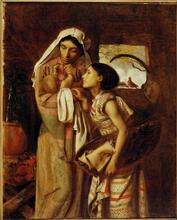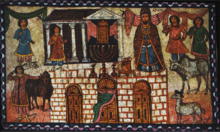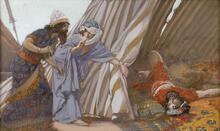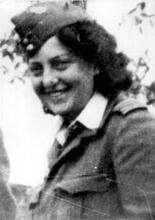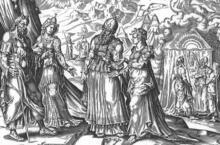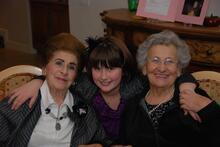Midwife: Midrash and Aggadah
The Rabbis assign significant value to the role of a midwife, especially highlighting the importance of Shiphrah and Puah, the team of midwives who protected Hebrew babies from the Pharaoh’s decree. The job of a midwife comes with much responsibility, as she not only helps with birth but aids the process of labor and provides nutritional support to both new mothers and infants.
Gentiles and Midwifery
In a The legal corpus of Jewish laws and observances as prescribed in the Torah and interpreted by rabbinic authorities, beginning with those of the Mishnah and Talmud.halakhic discussion, the Rabbis state that a Jewish woman may not act as a midwife for a Gentile woman, since she would help to deliver a child for idolatry. A Gentile woman, however, may assist in the delivery of the child of an Israelite (Codification of basic Jewish Oral Law; edited and arranged by R. Judah ha-Nasi c. 200 C.E.Mishnah Avodah Zarah 2:1). Another position forbids such midwifery by a Gentile woman since the non-Jews are suspected of capital offenses, and we fear that she might intentionally cause the baby’s death during the childbirth or immediately afterwards. If, however, other Jewish women stand by and supervise her, she may deliver the child of a Jewish woman (T Avodah Zarah 3:3).
According to some Rabbis, this is forbidden, even with supervision, since she could cause the death of the infant without being detected. As proof, the Rabbis cite the case of two Gentile women who quarreled with each other, and one called the other by the disparaging term: “midwife of Jewish women, the daughter of a midwife of Jewish women” (since this was her profession). The Gentile midwife responded to the other: “May as many ills come upon you as the number of children that I have killed, since I bring forth their blood like the foam of a river.” Other Rabbis, however, do not accept this as a proof, since the midwife’s words were mere bragging, to make an impression on her colleague (BT Avodah Zarah 26a).
Shiphrah and Puah
Two Hebrew midwives are mentioned in the narrative of the Egyptian servitude: Shiphrah and Puah. Most of the midrashim assert that they were Hebrew women and even identify them with renowned Biblical heroines: Jochebed and Miriam, or Jochebed and Elisheba daughter of Amminadab (BT Suspected adulteressSotah 11b). A single tradition maintains that these two women were Gentiles who converted, in which case “Hebrew midwives” is to be understood as the midwives of the Hebrew women. However, this tradition takes pains to assert that they were pious women and true converts (A type of non-halakhic literary activitiy of the Rabbis for interpreting non-legal material according to special principles of interpretation (hermeneutical rules).Midrash Tadshe, Ozar ha-Midrashim [Eisenstein], p. 474).
The Rabbis portray Shiphrah and Puah as working as a team, which is also reflected in their identification as a mother and daughter, or daughter-in-law and mother-in-law. Their midwifery is embodied in their names: Shiphrah would cleanse (meshaperet) the newborn so it would be beautiful. Puah’s role has lent itself to several interpretations. According to one opinion, she would bleat (poah) like a sheep to the woman in labor, which acted as a stimulus and aided the woman to deliver. Another view has her squirting (nofat) wine into the baby’s mouth, or she would cause the newborn to cry out (li-f’ot) when it was thought to be stillborn (Ex. Rabbah 1:13; Eccl. Rabbah 7:1:3).
The Rabbis relate that Pharaoh taught the midwives the secrets of the birth process, to aid them in implementing his decree to kill all the Israelite boys. He taught them that when a woman is about to give birth, her thighs are as cold as stone, thereby indicating to them that her time was near. He also instructed them that a boy is born with his face turned downward, looking at the earth from which he was created, while a female is born with her face turned upward, looking at the rib from which she was created. In this manner the midwives would already know the sex of the fetus at the beginning of the birth (BT Sotah 11b; Ex. Rabbah 1:14).
A Midwife’s Duties
Midwifery is regarded as a profession that entails a great deal of responsibility, along with numerous risks, both to the life of the mother and to that of the newborn. The midrash tells that Shiphrah and Puah knew that in the course of delivery a child is liable to be harmed and emerge with some physical defect, or even to die. Fearing that in such instances the Israelites would accuse them of fulfilling Pharaoh’s decree, they prayed to God to grant life to the mothers and their children and ensure that the fetus emerge unscathed. God accepted their prayer and kept alive both the mothers and their children, who were born whole and unblemished (Ex. Rabbah 1:15).
The role of midwife in Egypt, as described by the Rabbis, was not limited to bringing the baby into the world; she also encouraged the mother during her labor. This perception is supported by the account in Gen. 35:17, that when Rachel was experiencing a difficult labor, the midwife told her “Have no fear, for it is another boy in you,” thereby seeking to calm Rachel and save her life (Gen. Rabbah 82:8).
According to the Rabbis, the midwife’s duties included meeting the nutritional needs of the mother and infant. Not only did the Hebrew midwives not kill the boys, they also helped them to live by providing them with food and water (BT Sotah 11b). If the midwives saw that the new mothers were poor, they would go to the houses of rich women and collect food and water, thus enabling the poor women to keep their children alive (Ex. Rabbah 1:15). This depiction might not relate to the profession of midwifery in general; rather, it may be a topical description of the servitude from which the Israelites suffered in Egypt.
The Rabbis present the midwife as a young woman; according to one tradition, Puah was only five years old when she began to assist her mother. Another saying has it that the midwife herself needs another, in order to deliver her own infant (Ex. Rabbah 1:16), thus attesting that the midwives were themselves of childbearing age.
For the Rabbis, midwifery was an important calling, and the fact that Shiphrah and Puah are mentioned by name attests to their importance and good deeds (Sifrei Zuta, Pinhas 27:1). Even God compared Himself to a midwife when he brought the Israelites forth from Egypt, as is stated in Ezek. 16:4: “As for your birth, when you were born” (Eccl. Rabbah 3:8:2).
Janssen, Rosalind. “A New Reading of Shiphrah and Puah – Recovering their Voices.” Feminist Theology 27, no.1 (2018): 9-25.

